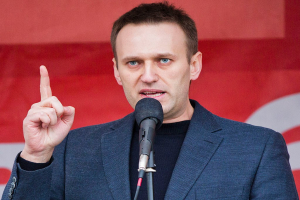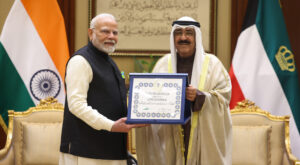
Jailed Russian opposition leader Alexei Navalny.
Washington: Alleging that they were involved in the poisoning of jailed Russian opposition leader Aleksey Navalny three years ago on August 20, 2020, the United States today designated four Russian Federal Security Service (FSB) operatives.
The FSB operatives Alexey Alexandrovich Alexandrov, Konstantin Kudryavtsev, Ivan Vladimirovich Osipov, and Vladimir Alexandrovich Panyaev, have been designated under the Sergei Magnitsky Rule of Law Accountability Act of 2012.
The US Department of the Treasury designated Alexandrov, Kudryavtsev, Osipov, and Panyaev, under the Russia Magnitsky Act for having acted as agents of or on behalf of a person in a matter relating to extrajudicial killings, torture, or other gross violations of internationally recognized human rights committed against individuals seeking to expose illegal activity carried out by officials of the Government of the Russian Federation. Alexandrov, Kudryavtsev, Osipov, and Panyaev were previously designated under Executive Order 13382, which targets weapons of mass destruction proliferators and their supporters, for acting for or on behalf of, directly or indirectly, the FSB.
“We are also imposing visa restrictions on Alexandrov, Kudryavtsev, Osipov, and Panyaev for their involvement in a gross violation of human rights, under Section 7031(c) of the Department of State, Foreign Operations, and Related Programs Appropriations Act, 2023,” Matthew Miller, Spokesperson, US Department of State, said. “Today’s actions are a reminder that there are consequences for violating internationally recognized human rights. The United States will continue to use the authorities at our disposal to promote accountability for such egregious acts,” he added.
The US further condemned the latest injustice against Navalny and renewed its call for his immediate release. Russian authorities imprisoned Navalny upon his return to Russia in January 2021, and on August 4, 2023, a Russian court sentenced Navalny to an additional 19 years in prison on, what the US alleged, were “unfounded charges of so-called extremism”.
“Today we remind Vladimir Putin and his regime that there are consequences not only for waging a brutal and unprovoked war against Ukraine but also for violating the human rights of the Russian people,” Under Secretary of the Treasury for Terrorism and Financial Intelligence Brian E. Nelson said. He added, “The assassination attempt against Aleksey Navalny in 2020 represents the Kremlin’s contempt for human rights, and we will continue to use the authorities at our disposal to hold the Kremlin’s willing would-be executioners to account”.
On August 20, 2020, approximately 30 minutes into a flight back to Moscow after campaigning in Tomsk and Novosibirsk, Navalny fell gravely ill, prompting an emergency landing in Omsk where he was treated by local hospital staff. The US government assesses that Russian Federal Security Service (FSB) officers used the nerve agent Novichok to poison Navalny. Novichok nerve agents were created by the Soviet Union and Russia is the only known country to have used these chemical weapons. The US alleged that Russia previously used a Novichok nerve agent in the March 2018 attempted assassination of former Russian military intelligence officer Sergei Skripal in Salisbury, United Kingdom.
The US Treasury Department claimed that the Russian operation against Navalny reportedly involved multiple individuals who were on the ground in both Tomsk and Omsk, as well as operatives coordinating the situation from afar. These individuals collaborated to surveil Navalny ahead of the attack, break into his hotel room and apply the chemical weapon to his personal belongings, and they attempted to erase any evidence of their operation following the attack.
Navalny came to prominence as a leading Russian anti-corruption activist more than a decade ago. “Exposés” published by him and his organization, the Anti-Corruption Foundation, “revealed” the “ill-gained” wealth of Russia’s elite politicians and their families, including, among others, President Vladimir Putin, former Prime Minister Dmitry Medvedev, and Kremlin spokesperson Dmitriy Peskov.
“As a vocal anti-corruption politician, Navalny has continued his fight against Russia’s kleptocracy despite the Kremlin’s attempts to silence him,” the US Treasury Department stated.
The majority of individuals implicated by the US in Navalny’s poisoning have been reported to have worked within or collaborated with the FSB Criminalistics Institute, an FSB sub-unit originally founded under the Soviet-era Committee for State Security (the KGB) as a specialized laboratory. The FSB Criminalistics Institute was designated on August 20, 2021, for acting for or on behalf of, directly or indirectly, the FSB.
Alexandrov is an FSB Criminalistics Institute operative who has been reported to be one of the main perpetrators of Navalny’s poisoning. Alexandrov also reportedly surveilled Nikita Isaev, another Russian anti-corruption activist, before Isaev’s death on a train in Russia in 2019.
Kudryavtsev is another FSB Criminalistics Institute operative reported to be part of the group involved in Navalny’s poisoning, the US claimed, adding that Kudryavtsev admitted to his involvement in the cleanup operation following Navalny’s poisoning. Kudryavtsev also reportedly was involved in the surveillance of Russian opposition politician and Putin critic Vladimir Kara-Murza.
Osipov is an FSB Criminalistics Institute operative who has been reported to be one of the main perpetrators of Navalny’s poisoning. Panyaev is an FSB operative who reportedly tailed Navalny on multiple occasions before the attack. Alexandrov, Kudryavtsev, Osipov, and Panyaev were previously designated on August 20, 2021, for acting for or on behalf of, directly or indirectly, the FSB.
As a result of today’s action, their property and interests in property that are in the United States or the possession or control of U.S. persons are blocked. All transactions by US persons or within (or transiting) the United States that involve any property or interests in property of designated or blocked persons are prohibited unless authorized by a general or specific license issued by the U.S. Department of the Treasury’s Office of Foreign Assets Control (OFAC), or exempt. These prohibitions generally include the making of any contribution or provision of funds, goods, or services by, to, or for the benefit of any blocked person and the receipt of any contribution or provision of funds, goods, or services from any such person.
– global bihari bureau





